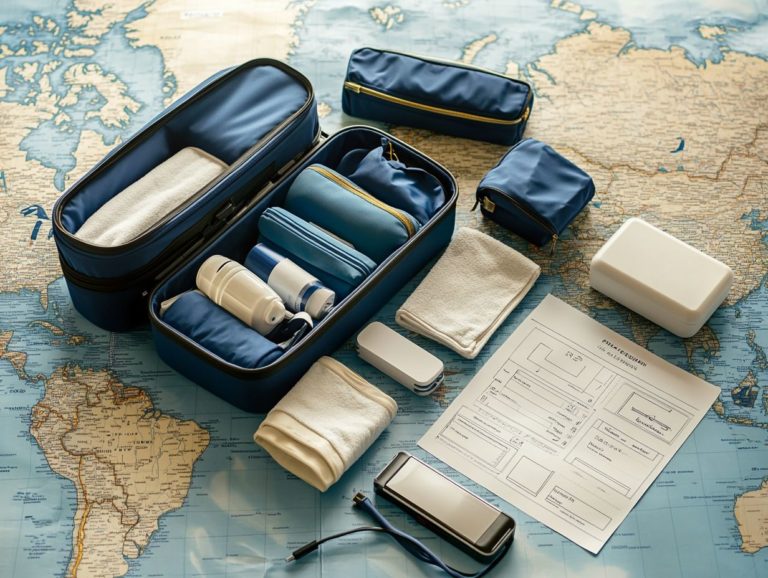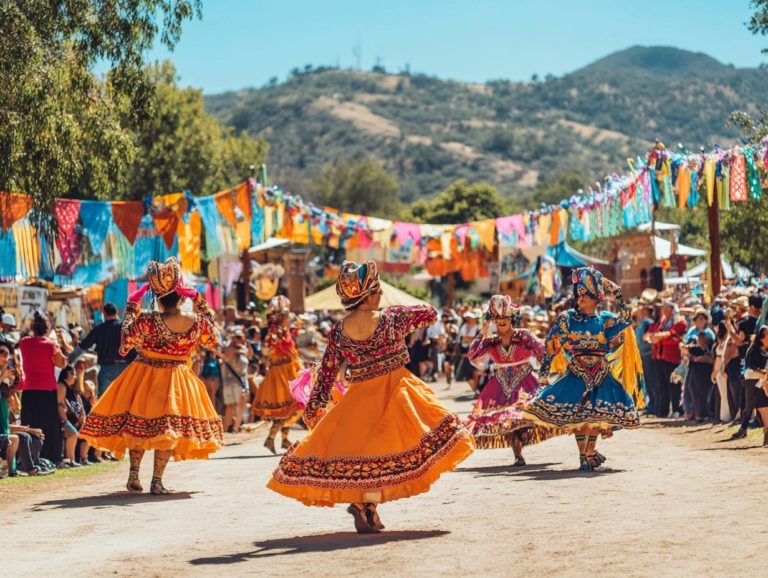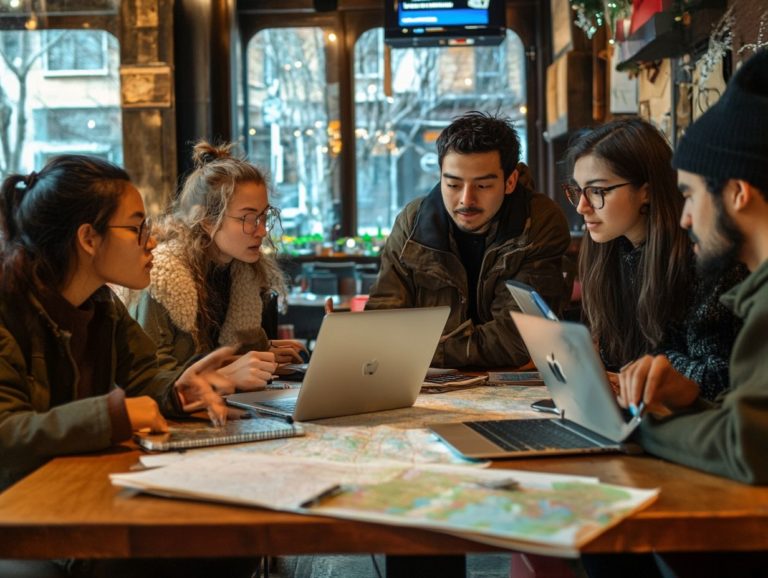Traveling Off the Beaten Path: Tips for Students
Off-the-beaten-path travel presents a refreshing alternative to the typical tourist experience. It beckons you to discover hidden gems and immerse yourself in local cultures.
This guide reveals the myriad benefits of this travel style. You’ll learn about deep cultural immersion and unexpected savings that can enhance your journey.
You’ll also find practical tips for planning your adventures, navigating cultural differences, and ensuring your safety along the way.
Whether you re a student seeking unique experiences or someone eager to break free from the tourist bubble, this article offers something valuable for everyone.
Contents
- Key Takeaways:
- Benefits of Traveling Off the Beaten Path
- Planning for Off the Beaten Path Travel
- Navigating Cultural Differences
- Staying Safe While Traveling Off the Beaten Path
- Frequently Asked Questions
- What are some tips for students who want to travel to lesser-known destinations?
- What should students keep in mind when traveling to lesser-known destinations?
- How can students stay on budget while traveling to lesser-known destinations?
- What are some benefits of traveling to lesser-known destinations for students?
- What are some potential challenges students may face when traveling to lesser-known destinations?
- How can students make the most out of their travel experience to lesser-known destinations?
Key Takeaways:
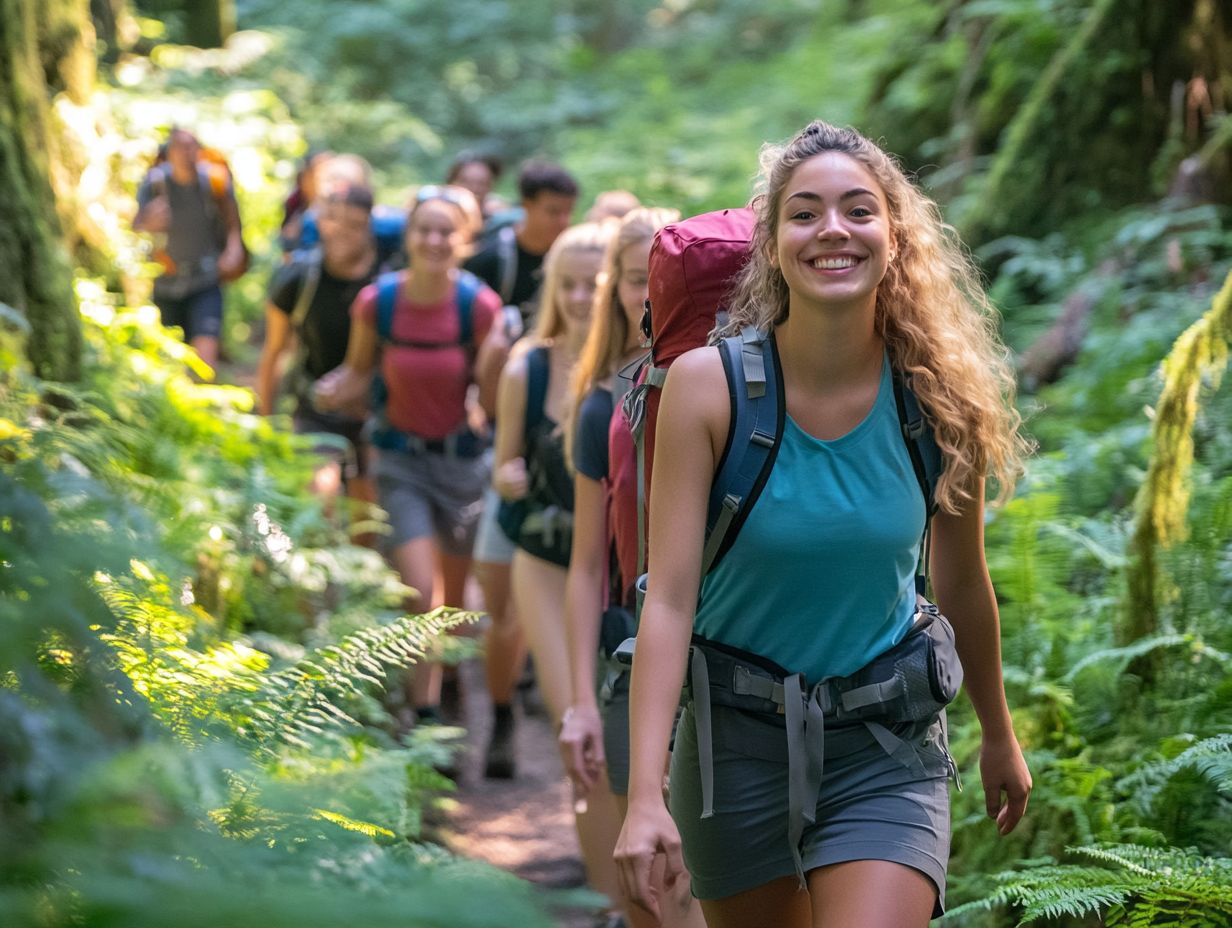
- Immerse yourself in local culture for authentic experiences when traveling off the beaten path.
- You can save money and find unique opportunities by choosing less touristy destinations.
- Plan ahead and budget wisely to ensure your trip is safe and enjoyable.
What is Off the Beaten Path Travel?
Off-the-beaten-path travel invites you to explore destinations that typically fly under the tourist radar. This approach allows you to dive into unique experiences that showcase local culture and history.
Adventuring in lesser-known locales can surprise and delight you. It allows for engaging in cultural exchanges and discovering hidden gems far removed from usual tourist traps.
By prioritizing authentic local experiences and embracing a more leisurely pace, you can forge meaningful connections with welcoming locals. This leads to deeper insights into the places you visit.
The philosophy behind this style of travel is all about breaking free from the mainstream. There s something undeniably captivating about visiting lesser-known locales; these journeys often unveil rich stories and traditions untouched by commercialization.
Engaging with local communities deepens your understanding of diverse histories and fosters an atmosphere of respect that bridges cultural divides.
Utilizing resources like local guides and local projects involving the community can significantly elevate your experience. This allows you to uncover the true essence of a destination while contributing to its preservation and appreciation.
Benefits of Traveling Off the Beaten Path
Traveling off the beaten path offers a wealth of benefits that can profoundly enrich your journey. You’ll experience genuine interactions with local cultures and communities.
This approach opens doors to exciting adventures and invites you to uncover unique experiences often sidelined by the mainstream tourist crowd.
When you engage with less touristy destinations, relaxed conversations with welcoming locals transform your trip into something truly memorable and meaningful.
Cultural Immersion and Authentic Experiences
Cultural immersion invites you to connect deeply with local communities. It offers authentic experiences that go far beyond usual sightseeing.
Engaging in activities like visiting community gardens, attending vibrant local festivals, and participating in unique events allows you to gain firsthand insights into the rich tapestry of local culture and traditions.
This immersive approach elevates your travel experience while fostering a profound respect for diverse lifestyles and customs.
Take Vietnam, for instance. A homestay with a local family in the Mekong Delta offers more than just a place to rest your head. It presents a chance to learn traditional cooking and fishing techniques that have been lovingly passed down through generations.
In Bangladesh, volunteering at an NGO dedicated to education provides you with invaluable experiences while making a positive impact on the community.
Joining cultural activities, like dance performances or local crafts workshops, allows you to forge genuine connections and grasp the nuances of daily life. This enriches your appreciation for the places you explore.
Cost Savings and Unique Opportunities
Traveling off the beaten path can lead to significant cost savings and unique opportunities that traditional tourism often overlooks. By choosing less touristy areas, you ll discover affordable accommodations like charming homestays and enjoy local cuisine at reasonable prices.
Engaging with locals reveals best-kept secrets, such as quaint markets and hidden eateries where prices are lower and flavors are delightful. Use resources like community forums or social media groups focused on budget travel for valuable insights.
Embrace public transportation or explore on foot to enhance your experience. This allows for spontaneous discoveries while keeping your expenses in check.
Planning for Off the Beaten Path Travel
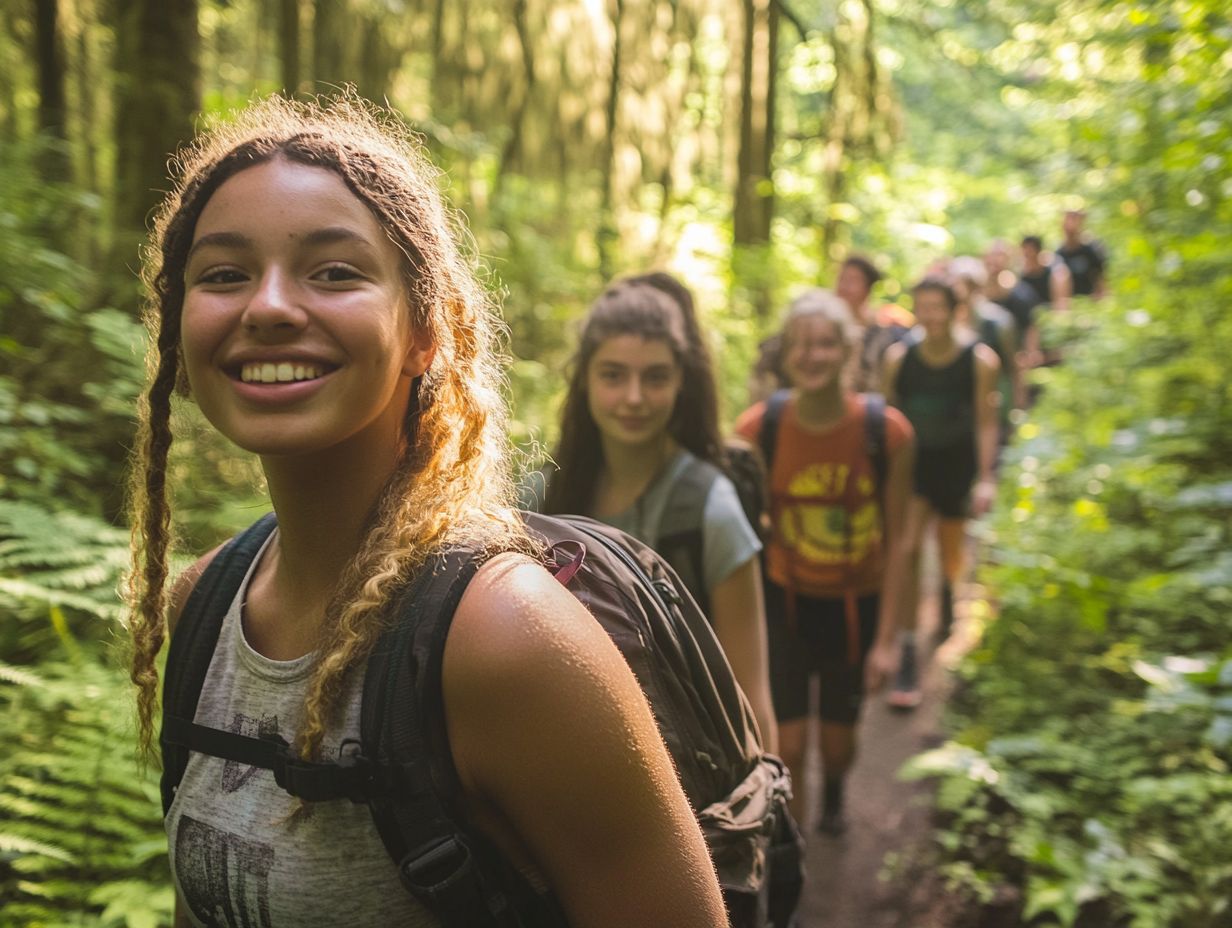
Planning your off-the-beaten-path adventure requires careful research and thoughtful safety precautions to ensure a rewarding and secure experience. As you explore lesser-known destinations, consider checking out traveling during breaks: top destinations for students, as tailored itineraries are crucial for uncovering unique opportunities.
Travel companies that specialize in unconventional journeys can make your planning process both seamless and exciting.
Researching Destinations and Safety Precautions
Researching destinations is essential for safe and enjoyable off-the-beaten-path travel. Gather local insights and focus on safety precautions like understanding public transport options and cultural customs.
Consult various resources such as online forums and travel blogs to uncover specific safety concerns. Engaging with locals provides authentic insights to help you navigate confidently.
Understanding local laws is vital since customs may vary greatly. Familiarize yourself with transportation options to enhance your efficiency and exploration.
Budgeting and Packing Tips
Effective budgeting and packing are key for your off-the-beaten-path travel planning. Allocate funds wisely for accommodations, activities, and meals. Strategic packing helps you adapt to diverse environments.
Explore budget-friendly options like hostels, guesthouses, or local homestays for authentic experiences at lower costs. Consider preparing meals with fresh produce from local markets.
Choose versatile, lightweight clothing that can be layered. This keeps you adaptable to changing weather while minimizing your packing load.
Embrace unexpected adventures, like hiking lesser-known trails or joining free city walking tours. These experiences enrich your journey and offer insights into local culture, all while being easy on your wallet.
Navigating cultural differences is essential for your off-the-beaten-path travel adventures. By understanding and respecting local customs, you open the door to meaningful interactions with the community.
Engaging in casual conversations with locals and being mindful of etiquette fosters a genuine sense of belonging and appreciation. This cultural sensitivity enriches your travel experience and nurtures positive relationships with host communities.
Respecting Local Customs and Etiquette
Respecting local customs and etiquette is vital for travelers looking to engage authentically with the diverse cultures you encounter.
Grasping the nuances of local traditions elevates your travel experience and fosters genuine interactions that can blossom into lasting memories and friendships.
For example, in many Asian countries, bowing is a customary form of greeting that conveys respect. In various Middle Eastern cultures, accepting an invitation to share a meal is a cherished gesture of hospitality.
To show respect, learn a few basic phrases in the local language and observe social cues like dress codes and dining etiquette. These thoughtful efforts enhance your interactions and demonstrate appreciation for the host’s way of life.
Dealing with Language Barriers

Language barriers can be tricky, but they also spark creativity! They open the door to creative communication and immersive cultural experiences. By using simple phrases, gestures, and translation apps, you can navigate conversations with ease.
To bridge these gaps, patience is your greatest ally. Embrace the inevitable misunderstandings that may occur. Using creative strategies like drawings, body language, or even musical gestures fosters mutual understanding.
Resources like language learning apps or pocket phrasebooks empower you to grasp basic expressions, smoothing out everyday exchanges. Engaging with locals to learn about their language facilitates communication and cultivates meaningful connections, enriching your journey.
Staying Safe While Traveling Off the Beaten Path
Your top priority is staying safe when exploring hidden gems. Lesser-known areas can present unique challenges that demand heightened vigilance.
Prioritize emergency preparedness by ensuring access to local contact information and resources that can assist you in unforeseen situations. Being aware of potential scams and dangerous scenarios is crucial for mitigating risks and ensuring a secure travel experience.
Emergency Preparedness and Communication
Emergency preparedness is essential for your travel safety, especially off the beaten path where resources can be scarce. Establish clear communication strategies by carrying important contact numbers and familiarizing yourself with public transport options. This proactive approach can enhance your safety and response to emergencies.
Take the time to educate yourself about local emergency services and pinpoint critical landmarks like hospitals or police stations before you set out. Packing a basic emergency kit including first-aid supplies, a trusty flashlight, and non-perishable snacks can be a game changer.
Don t forget to tap into local resources like community centers or tourist information desks. They can offer invaluable insights into available assistance and safety measures. In case of an emergency, knowing whom to reach out to local guides or friends back home can make a significant difference in how swiftly help arrives.
Prepare your own emergency kit today, and stay safe during your adventures!
Avoiding Scams and Dangerous Situations
Avoiding scams and dangerous situations is essential for a rewarding travel experience.
By engaging with the travel community, you can stay informed about common scams and unsafe areas, allowing you to navigate your journeys with confidence.
To spot potential scams, it s crucial to stay alert and observant of your surroundings. Trust your instincts; if something feels off, it probably is.
Be wary of overly helpful strangers who might steer you toward overpriced shops or unsolicited offers that promise extravagant experiences. Make the most of online forums or local apps to gather up-to-date safety tips and feedback from fellow travelers. These platforms often spotlight recent scams or neighborhoods to avoid.
Seeking advice from trustworthy locals can provide invaluable insights into safe transportation options and popular tourist pitfalls, ensuring your exploration of hidden gems is both enjoyable and secure.
Frequently Asked Questions
What are some tips for students who want to travel to lesser-known destinations?

- Do your research beforehand to find lesser-known destinations that still offer unique experiences.
- Connect with local students or organizations to get insider tips and recommendations.
- Be open-minded and flexible, as unexpected opportunities may arise.
What should students keep in mind when traveling to lesser-known destinations?
- Safety should always be a top priority, so research any potential risks and take necessary precautions.
- Respect the local culture and customs, and be mindful of your actions and behavior.
- Have a backup plan in case things don’t go as expected.
How can students stay on budget while traveling to lesser-known destinations?
- Opt for more affordable accommodations, such as hostels or homestays.
- Cook your own meals using local ingredients instead of eating out at expensive restaurants.
- Take advantage of public transportation or walk instead of using expensive tours or private transportation.
What are some benefits of traveling to lesser-known destinations for students?
- It provides a more authentic and immersive cultural experience.
- It allows for personal growth and self-discovery by stepping out of your comfort zone.
- It often saves you money compared to popular tourist destinations.
What are some potential challenges students may face when traveling to lesser-known destinations?
- Limited access to modern amenities and services.
- Language barriers and difficulty communicating with locals.
- Difficulty navigating unfamiliar environments and transportation systems.
How can students make the most out of their travel experience to lesser-known destinations?
- Keep an open mind and be willing to try new things.
- Engage with the local community and learn about their way of life.
- Take time to reflect and appreciate the unique experiences and perspectives gained from traveling to lesser-known destinations.

